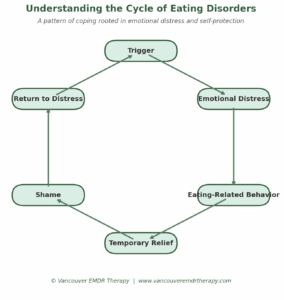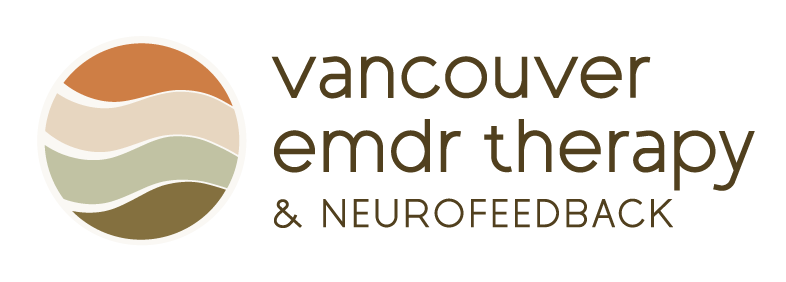If you’ve ever felt trapped in a painful cycle with food—restricting, binging, purging, or feeling constantly at war with your body—you’re not alone.
For many people, eating disorders are not really about food. They’re about finding ways to cope with deep emotional pain, shame, or a lack of safety that began long before the eating behaviors appeared.
 At Vancouver EMDR Therapy, we understand that these patterns are the body’s way of surviving overwhelming experiences. Healing isn’t about control—it’s about helping your nervous system feel safe again.
At Vancouver EMDR Therapy, we understand that these patterns are the body’s way of surviving overwhelming experiences. Healing isn’t about control—it’s about helping your nervous system feel safe again.
Understanding the Cycle of Eating Disorders
The cycle often looks like this:
Trigger → emotional distress → eating-related behavior → temporary relief → shame → return to distress.
This loop can feel impossible to break, even with insight and willpower. That’s because it isn’t just a pattern of thoughts—it’s a pattern wired into the nervous system.
When trauma or chronic stress go unresolved, the brain and body stay on high alert. Food and body behaviors can become powerful, if temporary, ways to manage that sense of danger inside.
Why Trauma Often Lives Beneath Eating Disorders
Many people with eating disorders have histories of:
- Emotional neglect or criticism
- Bullying or body shaming
- Early attachment wounding or abuse
- Times when their needs or feelings weren’t safe to express
In these experiences, the body learns that emotions, needs, or sensations—like hunger or pleasure—might lead to rejection or pain. Over time, disordered eating can develop as a way to numb, control, or avoid those unsafe sensations.
From a trauma perspective, eating disorders are survival strategies that once helped—but now keep you stuck.
How EMDR Therapy Works
Eye Movement Desensitization and Reprocessing (EMDR) is a trauma-focused therapy that helps your brain heal from the effects of overwhelming experiences.
Through bilateral stimulation—gentle eye movements, tapping, or tones—EMDR activates both sides of the brain to reprocess distressing memories and calm the nervous system. This allows your brain to integrate past experiences so they no longer trigger the same emotional or physical reactions.
During EMDR, you remain fully in control and grounded while gently revisiting the memories, sensations, and beliefs that drive your symptoms. The goal is not to relive trauma—but to help the brain and body release what’s been held too tightly for too long.
How EMDR Helps You Break the Cycle
EMDR helps address the root causes of eating disorder behaviors—not just the symptoms. As trauma is reprocessed, clients often experience:
- Less urge to restrict, binge, or purge
- More ease and compassion toward their body
- Relief from intrusive thoughts and shame
- Increased ability to feel emotions safely
- Stronger connection to hunger, fullness, and internal cues
You’re no longer fighting yourself—you’re healing the part of you that was protecting yourself.
 A Gentle, Step-by-Step Process
A Gentle, Step-by-Step Process
At Vancouver EMDR Therapy, EMDR work begins slowly and safely. Together, we focus first on building resources for grounding and nervous system regulation. Only when your system is ready do we move toward processing deeper memories that have been keeping you stuck.
This pacing allows healing to unfold at your body’s natural rhythm—without overwhelm or retraumatization.
Integrating EMDR into a Whole-Person Approach
Because eating disorders affect both body and mind, EMDR is most effective when part of a collaborative care plan. Our eating disorder specialist may coordinate with dietitians, physicians, or other therapists to ensure your medical and nutritional safety while focusing on trauma resolution and emotional healing.
Our goal is not to control behavior, but to restore connection—to your body, your needs, and your capacity for self-compassion.
Healing Is Possible
Recovery isn’t about perfection—it’s about freedom. When your brain no longer associates food or body sensations with danger, you can finally experience calm, clarity, and connection. You can trust your body again. You can nourish yourself from a place of care, not control.
EMDR helps you release the shame and pain of the past so you can live fully in the present—free from the cycle that once felt unbreakable.
Take the Next Step
Work with an eating disorder specialist and EMDR trained clinician Corinne Sudduth, LICSW.
If you’re ready to begin healing your relationship with food and your body, we’re here to help.
We offer a free 15-minute consultation to help you learn whether EMDR therapy is right for you.
Click on our “Appointment Calendar” button to schedule a consultation. You can also call or text us at 360-836-0050 to schedule.
You deserve a life where food, body, and self can exist in peace.




